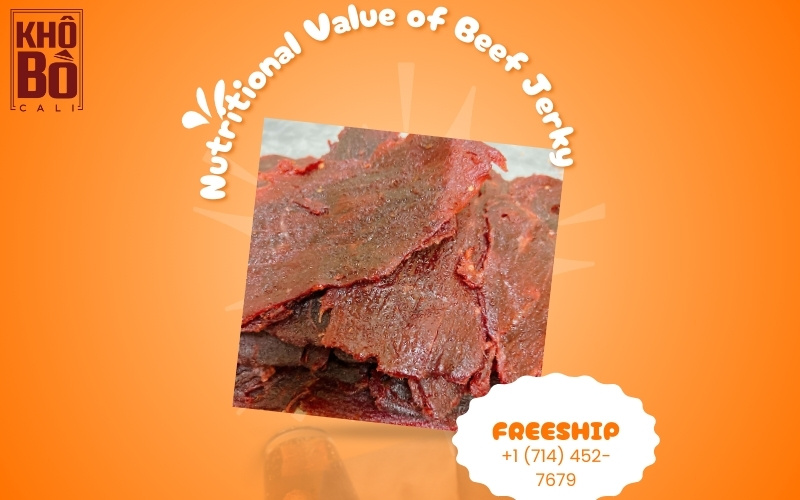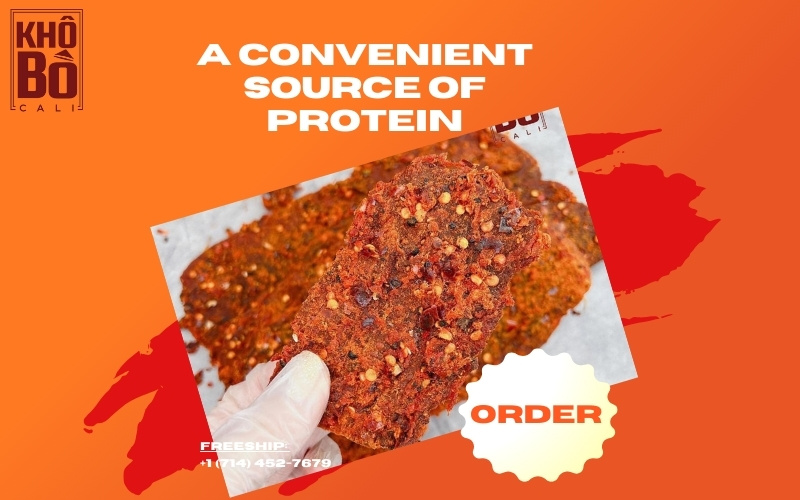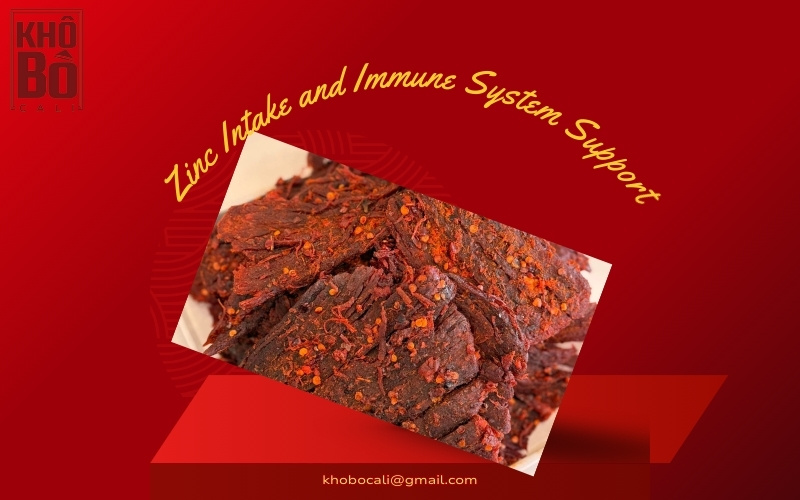Beef jerky has long been a favorite snack for many thanks to its rich flavor and convenient use. Beyond being a tasty treat, it also serves as a quick source of protein in daily diets. Still, some people wonder whether it truly supports a healthy lifestyle. In this article, we’ll explore the benefits of eating beef jerky and uncover how this popular snack can fit into your nutrition plan.
Nutritional Value of Beef Jerky

The nutritional profile of beef jerky can vary slightly depending on the brand, the cut of beef used, and the seasoning or marinating process. However, on average, a serving size of about 28–30 grams of beef jerky provides a compact yet energy-rich source of nutrients. In one serving, you’ll typically find:
-
Calories: 116
-
Total Fat: 7.26 g
-
Sodium: 505 mg
-
Carbohydrates: 3.12 g
-
Dietary Fiber: 0.51 g
-
Added Sugar: 2.55 g
-
Protein: 9.41 g
This balance of macronutrients makes beef jerky not only a convenient snack but also a practical option for those looking to boost protein intake while keeping portion sizes small.
The Benefits of Eating Beef Jerky for Your Health
Whether beef jerky is good for your health largely depends on how it is prepared. In most cases, beef jerky is made from lean cuts of dried beef that are naturally rich in protein, zinc, and iron—three nutrients that play a vital role in overall wellness.
A Convenient Source of Protein
Getting enough protein throughout the day can sometimes be a challenge, especially for people who are constantly on the go. Beef jerky makes this easier, as it is a portable, ready-to-eat snack packed with protein.
Protein is an essential macronutrient responsible for repairing and building cells, while also supporting strong bones, muscles, and healthy skin. Unlike carbohydrates and fats, your body cannot store protein for later use, which means you need a consistent intake every day to stay healthy.

The amount of protein you need varies depending on factors such as age, sex, body weight, and physical activity level. Many nutrition experts recommend that protein should make up about 10% to 35% of your daily calorie intake. For instance, someone consuming around 2,000 calories per day might aim for about 100 grams of protein, equal to roughly 400 calories. A standard 28–30 gram serving of beef jerky can provide nearly 10% of that daily protein goal, making it a smart option for supplementing your diet.
Zinc Intake and Immune System Support
A single 30-gram serving of beef jerky can provide nearly one-quarter of the daily recommended intake of zinc, making it a surprisingly powerful source of this essential mineral. Zinc plays a critical role in strengthening the immune system, supporting wound healing, and aiding in the body’s ability to fight off infections.

What makes beef jerky particularly beneficial is that zinc from animal-based foods, such as beef, is more easily absorbed by the body compared to zinc from plant-based sources. This means your body can make better use of the zinc it receives. Still, while beef jerky offers a convenient boost, nutrition experts emphasize that the best approach is to obtain zinc from a variety of foods as part of a balanced diet. By combining beef jerky with other nutrient-rich options, you can help ensure your immune system functions at its best.
Boosting Iron Intake
Beef jerky has been identified in research as a notable source of heme iron, the type of iron found in animal-based foods that the body can absorb far more efficiently than non-heme iron from plant sources. Iron plays an essential role in transporting oxygen throughout the body, ensuring that organs, tissues, and muscles receive the fuel they need to function properly.

Iron deficiency is one of the most common nutritional deficiencies worldwide, particularly among women due to factors such as menstruation, pregnancy, and higher nutrient demands. Symptoms of low iron can include fatigue, weakness, poor concentration, and reduced immunity. Incorporating beef jerky into your diet can provide a convenient and concentrated source of heme iron, helping reduce the risk of deficiency and supporting overall vitality.
While beef jerky can contribute meaningfully to iron intake, it’s most effective when included as part of a varied and balanced diet that contains other iron-rich foods.
What to Keep in Mind When Eating Beef Jerky
While beef jerky is a convenient source of protein, zinc, and iron, it also comes with certain health considerations most notably its sodium content. Excess sodium can cause bloating, water retention, and contribute to weight gain. During the drying process, manufacturers often add salt to preserve the meat and prevent spoilage. As a result, just one serving of beef jerky can contain around 20% of the recommended daily sodium intake for adults. Over time, high sodium consumption has been linked to elevated risks of hypertension, cardiovascular disease, osteoporosis, and kidney stones.
Another concern is the use of preservatives, such as sodium nitrite, commonly found in processed meats. Consuming these in large amounts may increase the likelihood of developing heart disease. Since beef jerky is classified as processed red meat, several studies suggest a connection between high consumption and a greater risk of type 2 diabetes, certain cancers, and heart disease. For this reason, health experts recommend eating beef jerky in moderation, as part of a balanced diet rich in whole foods and plant-based nutrients.

In fact, research shows that replacing some red meat with plant-based protein sources can lower LDL (“bad”) cholesterol and reduce cardiovascular risk factors. For those looking to cut back on red meat, there are plant-based alternatives to beef jerky such as dried mushrooms which provide a similar chewy texture and umami flavor.
When buying beef jerky, always check the ingredient label carefully. Some brands may include common allergens, such as soy or barley malt extract (a source of gluten). Proper storage is equally important: keep beef jerky sealed in an airtight package and in a cool, dry place. Only consume jerky that is within its expiration date and shows no signs of spoilage such as mold, discoloration, off-odors, or unusual texture.
By keeping these factors in mind, you can enjoy beef jerky as part of your diet without compromising your health.
Avoid Low-Quality, Cheap Beef Jerky
In today’s market, a wide range of beef jerky products is available, but not all of them meet proper safety and quality standards. Low-priced, mass-produced jerky often raises concerns about questionable ingredients, poor processing methods, or inadequate hygiene during production. Choosing such products may seem economical at first, but they can pose serious health risks in the long run.

Consuming low-quality beef jerky may expose you to harmful additives, excessive preservatives, or even unsafe levels of contaminants. These hidden dangers can lead to digestive issues, foodborne illnesses, or more severe health complications over time. For this reason, it is essential to be cautious when purchasing beef jerky always check the source, look for reputable brands, and ensure that the product has clear labeling, proper packaging, and valid expiration dates.
Spending a little more on high-quality jerky not only ensures better taste and texture but also protects your well-being. Your health is far more valuable than the short-term savings of buying cheap, unreliable products.
Readmore:
What is the best cut of meat for beef jerky
How do you store beef jerky? Here are 5 suggested ways to preserve beef jerky for longer use
Does Beef Jerky Expire? Everything You Need to Know Before Eating It
Where to Buy High-Quality, Authentic Beef Jerky?
If you are looking for premium beef jerky made with care, Khô bò CALI is a trusted choice that has been perfected over more than 40 years of tradition. Crafted from freshly slaughtered beef to ensure 100% freshness, only the finest cuts are selected lean, large pieces with long muscle fibers that guarantee both the right chewiness and a visually appealing texture. After trimming away excess fat, the beef is marinated with a rich blend of spices, then dried using time-honored techniques and the skill of experienced artisans. The result is tender, flavorful jerky with an irresistible deep reddish-brown color.

Unlike jerky slices, Khô bò CALI’s shredded beef jerky is seasoned to be spicier and more intensely flavored, making it especially convenient for snacking on the go. It is not just a delicious treat to enjoy with family and friends on weekends; it also pairs perfectly with salads, rice paper rolls, or other creative dishes. Beyond being a versatile snack, Khô bò CALI makes a meaningful gift a taste of home for those living abroad or a premium present for festive occasions such as Lunar New Year.
What sets Khô bò CALI apart is its commitment to quality and food safety. The jerky is produced in a closed, carefully controlled process without the use of preservatives. Every batch is consistent in flavor, aroma, and texture, offering both peace of mind and unforgettable taste.
For purchase inquiries or consultation, please contact us directly at:
📞 +1 (714) 452-7679 / +1 (714) 234-6899


